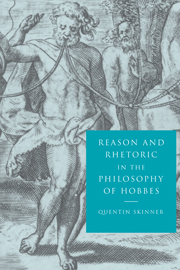Book contents
- Frontmatter
- Contents
- Acknowledgments
- Notes on the text
- Introduction
- PART I CLASSICAL ELOQUENCE IN RENAISSANCE ENGLAND
- PART II HOBBES AND THE IDEA OF A CIVIL SCIENCE
- 6 HOBBES'S EARLY HUMANISM
- 7 HOBBES'S REJECTION OF ELOQUENCE
- 8 HOBBES'S SCIENCE OF POLITICS
- 9 HOBBES'S RECONSIDERATION OF ELOQUENCE
- 10 HOBBES'S PRACTICE OF RHETORIC
- Conclusion: Why did Hobbes change his mind?
- Bibliographies
- Index
9 - HOBBES'S RECONSIDERATION OF ELOQUENCE
Published online by Cambridge University Press: 08 February 2010
- Frontmatter
- Contents
- Acknowledgments
- Notes on the text
- Introduction
- PART I CLASSICAL ELOQUENCE IN RENAISSANCE ENGLAND
- PART II HOBBES AND THE IDEA OF A CIVIL SCIENCE
- 6 HOBBES'S EARLY HUMANISM
- 7 HOBBES'S REJECTION OF ELOQUENCE
- 8 HOBBES'S SCIENCE OF POLITICS
- 9 HOBBES'S RECONSIDERATION OF ELOQUENCE
- 10 HOBBES'S PRACTICE OF RHETORIC
- Conclusion: Why did Hobbes change his mind?
- Bibliographies
- Index
Summary
THE RETURN TO CIVIL SCIENCE
When Hobbes reissued De Cive in a revised and expanded form in 1647, he added a new ‘Praefatio ad Lectores’ in which he explained that, by publishing the original version in 1642, he had broken the sequence in which he had initially intended to present his system of philosophy. As we saw in chapter 6, he came to the conclusion in the course of the 1630s that the elements of philosophy can be divided into three principal parts: body, man and citizen. Following this discovery, as the 1647 ‘Praefatio’ recounts, he decided to write three corresponding books, ‘in the first of which I would have spoken of the body and its general properties’, while the second would have examined ‘Man and his particular faculties and emotions’ and the third ‘the State and duties of citizens’. However, ‘it happened that in the meantime my native country, a few years before the civil war broke out, began to seethe with questions about the right of Sovereignty and the obligations of citizens to obedience’. This made it seem a matter of urgency to issue the volume on citizenship and its duties at once, in consequence of which ‘the section which was to have been last in order appeared first in time’.
After completing De Cive in November 1641, Hobbes reverted to working on his philosophical system in the order in which he had originally conceived it.
- Type
- Chapter
- Information
- Reason and Rhetoric in the Philosophy of Hobbes , pp. 327 - 375Publisher: Cambridge University PressPrint publication year: 1996



